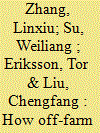|
|
|
Sort Order |
|
|
|
Items / Page
|
|
|
|
|
|
|
| Srl | Item |
| 1 |
ID:
134891


|
|
|
|
|
| Summary/Abstract |
This paper examines the relationship between employee turnover, HRM practices and innovation in Chinese firms in five high technology sectors. We estimate hurdle negative binomial models for count data on survey data allowing for analyses of the extensive as well as intensive margins of firms' innovation activities. Innovation is measured both by the number of ongoing projects and new commercialized products. The results show that higher R&D employee turnover is associated with a higher probability of being innovative, but decreases the intensity of innovation activities in innovating firms. Innovating firms are more likely to have adopted high performance HRM practices, and the impact of employee turnover varies with the number of HRM practices implemented by the firm.
|
|
|
|
|
|
|
|
|
|
|
|
|
|
|
|
| 2 |
ID:
145581


|
|
|
|
|
| Summary/Abstract |
Using three-wave survey data for four villages of Jiangsu Province in China, the present paper examines whether and to what extent off-farm employment affects the technical efficiency of agricultural production. The level of technical efficiency is measured using a stochastic frontier production function approach. Based on estimation results from instrumental variable panel quantile regressions we find that there is a positive significant effect of off-farm employment on the level of farm technical efficiency. We also find that fragmentation of farmland is a barrier to the improvement of technical efficiency. In addition, we find a downward trend in the level of agricultural technical efficiency among our sample. Therefore, the Chinese Government should stimulate agricultural mechanization and the development of farming techniques to improve technical efficiency in the context of increasing off-farm employment.
|
|
|
|
|
|
|
|
|
|
|
|
|
|
|
|
| 3 |
ID:
101161


|
|
|
|
|
| Publication |
2010.
|
| Summary/Abstract |
While there is a large and growing body of research describing and analyzing changes in the Chinese income distribution, researchers have paid considerable less attention to inequality of opportunity. The aim of this paper is to contribute to filling this gap in the literature. The two main questions addressed empirically for the first time in a Chinese context are: to what extent are individuals' incomes and individual income differences due to factors beyond the individual's control (in Roemer's terminology "circumstances") and to what extent are they due to outcomes of the individual's own choices ("effort"). What is the relationship between income inequality and inequality of opportunity?
For this purpose we use data from the China Health and Nutrition Survey collected from nine provinces during the period 1989 to 2006. The CHNS has detailed information about incomes and other factors enabling us to construct a host of circumstance and effort variables for the offspring.
We find that China has a substantial degree of inequality of opportunity. Parental income and parents' type of employer explain about two thirds of the total inequality of opportunity. Notably, parental education plays only a minor role implying that parental connections remain important. The results show that the increase in income inequality during the period under study largely mirrors the increase in inequality of opportunity. Thus, increased income inequality does not reflect changes in effort variables, or expressed differently, increased income inequality has not been accompanied by a decrease in inequality of opportunity.
|
|
|
|
|
|
|
|
|
|
|
|
|
|
|
|
| 4 |
ID:
136277


|
|
|
|
|
| Summary/Abstract |
This paper estimates the intergenerational health transmission in China using the 1991–2009 China Health and Nutrition Survey (CHNS) data. Three decades of persistent economic growth in China has been accompanied by high income inequality, which may in turn be caused by the inequality of opportunity in education and health. In this paper, we find that there is a strong correlation of health status between parent and their offspring in both the urban and rural sectors, suggesting the existence of intergenerational health inequality in China. The correlation is robust to various model specifications, including the control of unobserved household heterogeneity using instrumental variables. We also find that parents' socio-economic characteristics and environmental choices are strongly correlated with their own and their children's health, supporting the “nature–nurture interaction” hypothesis. The Blinder–Oaxaca decomposition further indicates that 15% to 27% of the rural–urban inequality of child health is attributable to the endowed inequality from their parents' health. An important policy implication of our study is that the increasing inequality of income and opportunity in China can be ameliorated through the improvement of the current generation's health status and living standards.
|
|
|
|
|
|
|
|
|
|
|
|
|
|
|
|
| 5 |
ID:
149760


|
|
|
|
|
| Summary/Abstract |
This paper sheds light on how the growing number of off-farm employees affects the labor allocation of female and male left-behind farmers in the Chinese agricultural sector. We find no direct effect of off-farm employment on left behind workers' total working time in farming, nor do we observe a gender difference in this respect. However, we do find that increasing off-farm work is associated with fewer days worked on staple crops, and in the harvesting and sales stages of the production process. Hiring labor and buying agricultural services also impact left behind workers' time allocation. Moreover, we find that in China, contrary to several other developing countries, there is no trend towards a feminization of agriculture, but rather a tendency in the reverse direction.
|
|
|
|
|
|
|
|
|
|
|
|
|
|
|
|
|
|
|
|
|